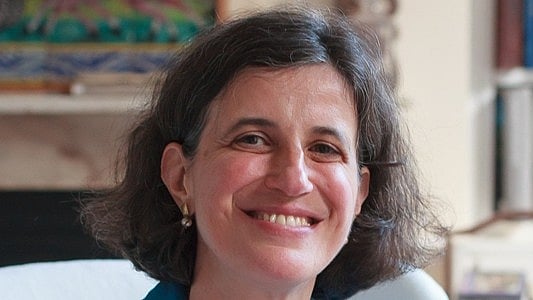POLITICS
London-based Hindi scholar deported from Delhi Airport in dead of night. Why?
SOAS professor Francesca Orsini’s deportation despite holding a valid visa highlights growing threats to academic freedom—and India’s intensified resistance to international scrutiny

Renowned Hindi scholar and SOAS, London University professor emerita Francesca Orsini was denied entry into India in the wee hours of October 21 despite possessing a valid five-year e-visa, and was told she would be immediately deported, reports the Wire.
Orsini — acclaimed for her seminal work The Hindi Public Sphere 1920–1940: Language and Literature in the Age of Nationalism — had flown into Delhi via Hong Kong after participating in an academic conference in China. She planned to visit friends and has previously travelled in India as recently as October 2024.
Speaking from Delhi airport, Francesca Orsini told reporters, “I am being deported. That is all I know,” and confirmed that no reason was shared by immigration authorities. She was advised to make her own way home from London, where she resides.
As publisher Permanent Black amplified in the wake of this incident, Orsini’s special interest is multilingualism in South Asian literary cultures, with an emphasis on Hindi / Urdu texts.
Published: undefined
Orsini’s deportation marks the fourth known incident in recent years where international scholars have been barred entry to India — even though holding valid travel documents. Others include anthropologist Filippo Osella, architect Lindsay Bremner and Kashmiri academic Nitasha Kaul (in Kaul’s case, her OCI card was subsequently revoked; Sweden-based professor Ashok Swain also had his OCI cancelled, though he later won relief in court).
Published: undefined
Academic organisations and civil society have expressed alarm, seeing these deportations as symptomatic of India’s declining academic freedom.
In 2021, during the Covid pandemic, the central government issued guidelines requiring prior political clearance for international scholars invited to online academic events, further tightening controls over cross-border academic exchange.
Published: undefined
The Orsini incident comes amid growing international scrutiny of India’s own record with freedom of speech — and criticism of shrinking space for dissent in civil society and academia alike. A recent global report by Scholars at Risk — a global network of over 650 universities, representing the voices of thousands of academics across 40 nations worldwide — identified India as a prominent example of academic freedoms being circumscribed, with universities increasingly imposing restrictions on protests, seminars and even slogans, while police and political groups crack down on campus demonstrations. The report was titled ‘Free to Think’.
Recent campus incidents in India have certainly exposed the rising intolerance faced by academics: from the physical attack on Dalit rights advocate Professor Chengaiah at Sri Venkateswara University, to the cancellation of Middle East-themed seminars at Jawaharlal Nehru University (JNU) and RSS-led disruptions of cultural festivals in Udaipur.
Leading voices in Indian academia, such as historian Ramachandra Guha, have described the government’s attitude as “insecure, paranoid, and even stupid”. Many see the growing clampdown on scholars as damaging to India’s standing as a global centre of learning and affecting its profile as a rich context for research studies.
Published: undefined
Indian academic and author Apoorvanand, who counts the London-based scholar a friend, called Orsini’s deportation a “direct attack on scholarship”.
Published: undefined
Political opponents such as the Trinamool Congress’ Sagarika Ghose held prime minister Narendra Modi personally accountable, calling the ruling dispensation “narrow-minded and backward-looking” and alleging the regime is “destroying the open-minded scholarship and excellence India has always stood for”.
Published: undefined
Indian historian and author Mukul Kesavan derided, “The visceral hostility of the NDA government to scholars and scholarship is something to behold. A government ideologically committed to Hindi has banned Francesca Orsini. You can't make this up.”
Published: undefined
Historian and queer activist Mario de Penha blamed the incident on the RSS-BJP ideology, posting on social media, “Shameful [and] terrifying that this intellectually primitive RSS govt. would prevent a Hindi scholar of global distinction like Francesca Orsini from visiting India.
“Shameful, because Orsini's wisdom surpasses that of any of the dunces the Sangh routinely doles out Padma awards to.
“Terrifying, because the Sangh's weaponisation of the visa regime will significantly hinder academic work on India outside our borders, after the freedom of scholars within India has already been curtailed by over 1 years of Hindutva supremacy.
Published: undefined
Meanwhile, the UK embassy said it was “aware of the incident” and is “seeking clarification”.
No official explanation has been provided by the Indian government or Delhi airport immigration authorities, heightening claims that arbitrary restrictions imposed on scholars with critical or alternative viewpoints — particularly foreign nationals — are hindering intellectual exchange and marking a dangerous turn for academic autonomy in India.
Published: undefined
Follow us on: Facebook, Twitter, Google News, Instagram
Join our official telegram channel (@nationalherald) and stay updated with the latest headlines
Published: undefined